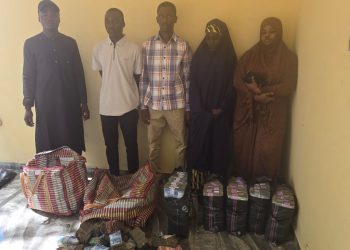By Nkechi Eze
The Nigerian Meteorological Agency (NiMet) and the National Agency for the Prohibition of Trafficking in Persons (NAPTIP) have signed a Memorandum of Understanding (MoU) to enhance public awareness on the effects of climate change and reduce the vulnerability of at-risk communities to human trafficking.
The agreement was formalised on Wednesday, 14th May 2025, during a brief ceremony at NiMet headquarters, and marks a strategic collaboration between both agencies to tackle the often-overlooked intersection between environmental crises and exploitation.
Speaking at the signing ceremony, the Director General and Chief Executive Officer of NiMet, Professor Charles Anosike, highlighted the significance of the partnership in bridging a critical knowledge gap.
“It is unfortunate that increased vulnerability to human trafficking as a result of the effects of climate change is still not sufficiently acknowledged,” Professor Anosike stated.
“However, this partnership with NAPTIP is part of our collaborative efforts to disseminate weather and climate information to vulnerable communities to enable adequate preparedness for climate extremes.”
He reiterated NiMet’s readiness to support early warning dissemination and data sharing that will help prevent distress situations that often push individuals especially women and children into exploitative conditions.
On her part, the Director General of NAPTIP, Binta L. Adamu Bello, described the partnership as timely and strategic, stressing the need for broader public sensitisation on the risks of climate-induced displacement and the link to trafficking.
“It is very critical that we create awareness across the country so that we can reduce distress migration arising from climate disasters such as floods,” she said.
Under the terms of the agreement, NiMet will provide NAPTIP with a wide range of meteorological services, including early warnings on extreme weather events, seasonal climate outlooks, and vulnerability assessments. The agency will also offer technical support in interpreting meteorological data to enhance anti-trafficking interventions and planning.
Additionally, NiMet is expected to deliver climate risk assessments to help NAPTIP identify displacement-prone regions where trafficking risks are high. A climate vulnerability map will also be provided to integrate weather-based insights into NAPTIP’s operational risk frameworks.
Both agencies affirmed their shared commitment to using data, awareness, and proactive communication to safeguard vulnerable populations across Nigeria.















